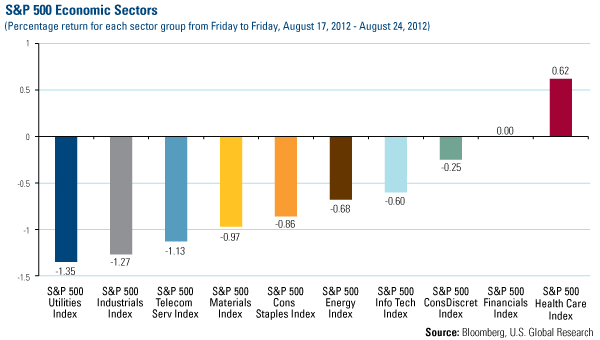U.S. Equity Market Radar (August 27, 2012)
The S&P 500 Index fell 0.50 percent this week as the market finally took a breather after rising for six weeks in a row. Economic news was relatively light and most of the market’s focus was on the potential for monetary policy action from either the Federal Reserve or European Central Bank. The market experienced some interesting rotation this week as normally defensive areas such as utilities and telecom services were among the worst performers.

Strengths
- The health care sector was the best performer this week, rising 0.62 percent driven by a broad-based rally. Best performers included Coventry Health Care, Alexion Pharmaceuticals and Watson Pharmaceuticals. Large-cap names in the space also performed well with Celgene, Eli Lilly and Bristol-Myers Squibb rising by more than 3 percent.
- The financial sector was flat for the week as Federated Investors jumped nearly 7 percent on news that the Securities Exchange Commission had dropped plans on money market reform. Other strong performers included Citigroup, Discover Financial and Bank of America.
- Coventry Health Care was the best performer in the S&P 500 this week, rising by 19.46 percent, as Aetna agreed to buy the company for $5.7 billion.
Weaknesses
- The utilities sector lagged for the second week in a row as the market rotated into other areas. Utilities remained the worst-performing sector over the past three months.
- Industrials also underperformed this week with an eclectic mix leading the sector lower as R.R. Donnelley, Ryder and Waste Management were the worst performers.
- Big Lots was the worst performer this week in the S&P 500, falling by more than 21 percent, as the company reported lower-than-estimated sales and earnings for the second quarter.
Opportunity
- The market remains focused on potential monetary policy action from the Fed, the ECB and China, looking past the current economic weakness.
Threat
- The S&P 500 has almost reached its April high, a technical resistance level, and could be vulnerable to any disappointments from global central bankers.













